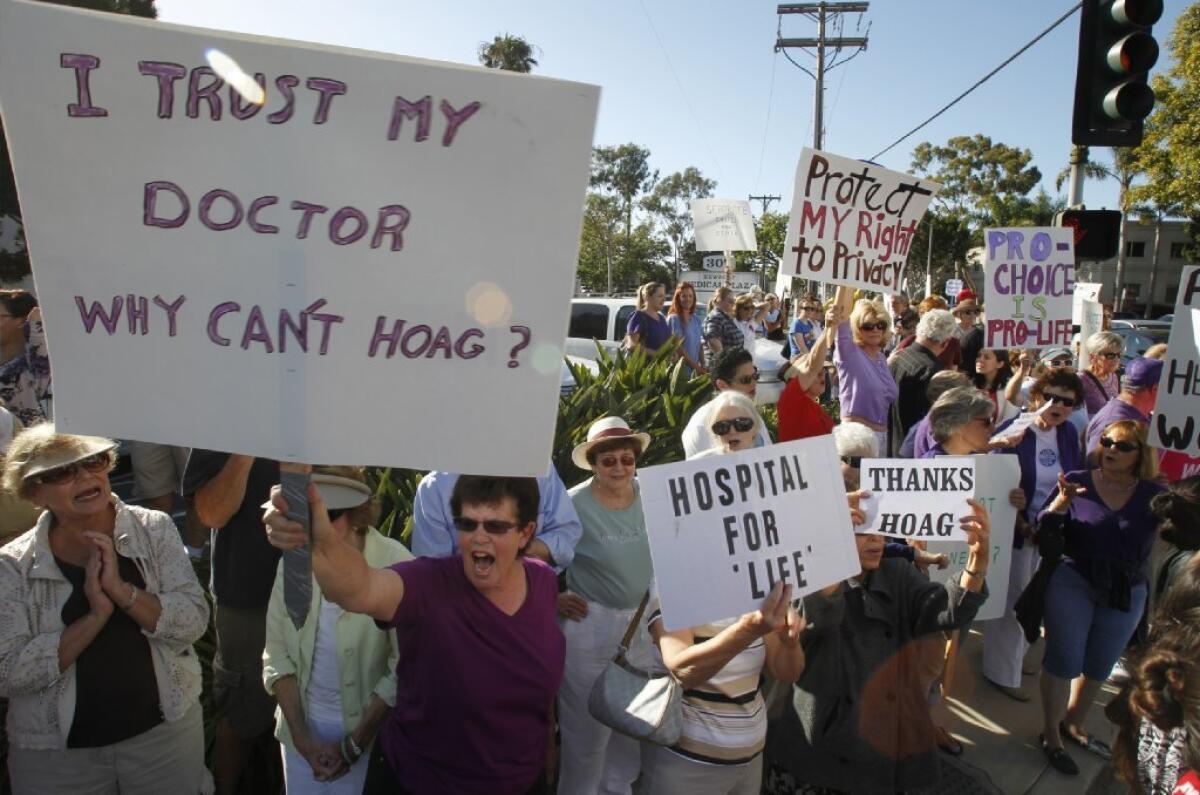Hoag Hospital and womens rights: Kamala Harris extracts more pledges

- Share via
The underhanded way that women’s reproductive rights were abridged in Orange County last year after the merger of Hoag Hospital in Newport Beach with the Catholic hospital chain St. Joseph Health System raised important issues for the community.
California Atty. Gen. Kamala Harris, who had originally blessed the merger, has addressed those issues, and it looks like she’s taken some positive steps to protect women’s reproductive services. An agreement between her office and Hoag unveiled Friday fixes some, though not all, the flaws in the merger deal.
First, some background. Even though OB/GYNs had been explicitly assured that the merger would bring about “no change” in women’s health services at Hoag -- including no change in the availability of elective abortions -- Hoag management abruptly barred abortions last spring. That ban remains in place.
Hospital management claimed the reason it barred abortions had nothing to do with St. Joseph policies against them. Instead, it implied that Hoag physicians performed so few abortions that they couldn’t meet the “requirement for clinical excellence” for the procedures. The medical staff disputed Hoag’s statistics on the number of abortions performed, as well as the implication that they weren’t up to the task. Evidence soon surfaced that Hoag indeed was responding to St. Joseph’s “sensitivity” about abortions.
That raised concerns that the abortion ban was only the top of a slippery slope. Some feared other procedures at odds with Catholic doctrine would be barred, too, after a 10-year waiting period that Harris had mandated in her original approval terms. There were also questions about whether Hoag eventually would have to comply with other strictures in the Catholic Church’s “ethical and religious directives for Catholic health care,” or ERDs, including those affecting end-of-life provisions in Hoag patients’ living wills.
The new agreement addresses these concerns. Hoag states explicitly that it will not be bound by ERDs in the future. That’s a permanent commitment, and it covers any efforts by St. Joseph to impose the ERDs through a “statement of common values,” the document through which St. Joseph imposed its abortion policy on Hoag last year.
The agreement also clarifies the murkiness of the ban on “direct abortions” -- a Catholic term, not a medical one, which includes, in some cases, even abortions that might threaten the life of the mother.
Some feared the ban might be construed to prevent the hospital treating women with a variety of miscarriages. It’s now explicit that “imminent, incomplete, inevitable, and/or septic miscarriages” are not considered “direct abortions” and therefore can be managed at Hoag. The agreement also makes clear that Hoag can’t interfere with physicians performing procedures in their private offices, even if those are located on Hoag’s premises or in buildings Hoag owns.
Another provision extends the period, from 10 to 20 years, that Hoag is committed to maintaining women’s reproductive services “at the same types and levels.” That should help ensure the provision of these services at Hoag for the better part of a generation.
The new deal, then, preserves what was left of women’s health services at Hoag after St. Joseph took it over. But it doesn’t make the transparency and integrity of the Hoag and St. Joseph officials who concocted this merger any less questionable.
Hoag flatly misled its own medical staff about the consequences of the deal and may well have misled Harris, who had the authority to block it. Harris had heard “substantial allegations from members of the community about Hoag’s statements during the approval process,” according to Jill Habig, a special assistant attorney general. Some of these involved its claims about the prevalence of abortions.
There were also complaints that Hoag wasn’t complying with some of the conditions Harris laid down concerning the availability and accessibility of women’s health services at the institution.
Harris’ investigation of those allegations is effectively ended by this agreement, though her office will continue to monitor Hoag’s compliance.
But in one sense, serious damage to women’s rights still has been done. Abortions are legal in California, as they are nationwide. Because Harris approved this merger last year -- and allowed a Catholic hospital to impose its will on a Presbyterian partner to ban a legal procedure -- women’s ability to obtain a full range of health services at one large, important community hospital has been permanently hobbled.
More to Read
Get the L.A. Times Politics newsletter
Deeply reported insights into legislation, politics and policy from Sacramento, Washington and beyond. In your inbox twice per week.
You may occasionally receive promotional content from the Los Angeles Times.











